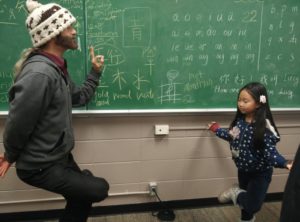It’s taken Camosun College’s student Mandarin Club five years to get to where they’re at today. Sisters Esther and Sarah Hack are two of the Camosun students who run the club. They say there are a lot of different people in the club, including Camosun alumni and current UVic students.
“We have a lot of students who are studying in different programs come back the Mandarin Club to learn,” says Esther. “For example, we have friends who study Japanese but come to learn Chinese.”
In the Mandarin Club, students have a chance to learn and study China and Chinese culture. Esther says that the students sometimes learn through experiences that they get to be a part of at the club’s meetings.

“How we learn about China and Chinese culture is through events,” she says. “For example, learning about the tea culture—we’re going to possibly have a time for learning about gongfu tea, which is a lot about the timing of drinking tea and having a special counselling teacup.”
The Mandarin Club has also watched performances and keeps its members thinking, and learning, over email. Esther says one performance they saw—by New York-based Shen Yun Performing Arts—was particularly educational.
“It’s a great way for students to learn about history because the dance tells you about the different myths and legends and different dynasties,” says Esther, adding that there were traditional Chinese instruments used in the performance, which was also educational.
Esther says that there are other perks to joining the Mandarin Club beyond getting to see interesting performances.
“Other advantages would be connecting students with students, and learning about an Asian culture and Asian language that is used today,” she says.
Sarah says that the club is a great way to make friends, learn another language, and “expand awareness.”
“So people benefit, not just [those who] learn Chinese but also, on the other side, we have people who are Chinese and come to the club, and they practice their English.”
Esther says that students gain a lot from meeting people in the club and says that learning another language can be very helpful to them.
“I think we absolutely benefit from meeting people, making more human connections, building the relationship, then learning the other language,” she says, adding that with the confidence of a second language comes the “faith to be creative.”
The Mandarin Club will screen the documentary Hard to Believe at 6 pm on October 13, at the Gibson Auditorium (Young 216, Lansdowne campus); admission is free.
